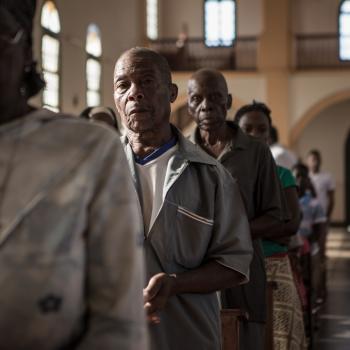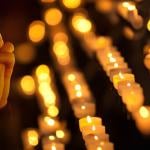 A few years ago, I decided to become more contemplative.
A few years ago, I decided to become more contemplative.
By nature, I am an action-oriented person (I frequently overuse the word “overwhelmed” and yet refuse to stop plowing forward). My husband and I work for a Christian non-profit with core central values of contemplation and activism. As we live and work in a diverse, chaotic, lovely neighborhood, we have been encouraged to regularly find time to be alone—to refresh and recharge in a culture of frenzy and productivity.
So two years ago, we tried it. We secured babysitting for our daughter and booked a twenty-four hour retreat at a nearby Catholic retreat center.
It was March in the Midwest when we drove two hours outside of our city and checked in at the central lodge of the center. Since this was our first time, we were required to sit down with the spiritual director for a chat. An older, firm woman, she went over a bit of the history of the center and gave us some advice and tips for our stay.
She was very stern in her admonitions that we were not to go visiting each other’s hermitages in the middle of the night; I successfully stifled my giggles as I realized she was not joking, not even the tiniest bit. She gave us each a walking stick with a sharp point at the end (there was a good thick inch of ice covering all of the pathways that week, plus it was good for keeping wild animals at bay). She encouraged us to roam the pathways and the woods, to enjoy the overlook at the frozen lake, to take the time to quiet our souls.
I said goodbye to my husband and was led to my own little hermitage, a tiny little cabin with little more than a bed, a chair, and a cross on the wall. I was left alone, so utterly alone, and I sat on the bed to take it in.
Immediately, I jumped up. I took stock of my provisions: a small basket of sustenance provided by the local monks—bread, cheese, and apples; a jug of water and a small basin for washing up; a side table with a copy of the Holy Scriptures and a book of contemplations written by the founder of the retreat center; a small gas lamp on the wall for when it got dark. And that was it.
The outhouse was out the door and a short walk away. It took me five minutes to get situated, unpacking my small bag. I sat in the rocking chair and made a plan to make the most of my contemplative retreat.
First of all, I would be fasting. I was hardcore, all the way, and I was here to listen to the voice of the Lord, after all. I would only read the Scriptures and journal my response. I would take walks every two hours during the daylight, and at night I would sleep the deep and long sleep of the mother with no child to wake her. And by the time I left, I would be a changed woman.
I would be calm. I would not be overwhelmed by my beautiful, terrible life. I would have all the answers, all the joy, all the hope I needed to get me through the next round of crisis and chaos.
It went…badly. The words on the pages of the onion-skinned Bible slipped in one ear and out the other, familiar in the unpleasant way of tolerated but unloved family members. I wrote page after page in my journal, but it all seemed the same variation of questions and complaining.
Outside I was cold and irritable, sitting on a snow-covered bench looking at an ugly, frozen lake. I slipped and slid on the way to the outhouse, cursing simplicity. At night, it was hard to sleep—the utter quiet, the moon glinting off the snow. It was hard to be alone with myself.
I met up with my husband at the appointed time at the main lodge the next day.
“How was it?” I asked him.
“Great!” he said enthusiastically.
He told me how he had arrived in his hermitage, eaten all of his food in one fell swoop, and then slept for over twelve hours. The next day, he wandered the woods, and sat on his bed and listened as God told him how much he was loved.
I smiled, but inside I wanted to scream. How had he aced this test while I had failed so miserably?
We both went to a debriefing session with the same spiritual director. She took one look at my husband—his bearded, smiling face—and said: “I can see that you had a restful time here.” She turned to look at me. She said nothing for a few minutes, and then—“well, you might be one of those people who needs to be here for forty-eight hours or more. Sometimes it takes that long for people to let go of themselves.”
She patted my knee, not unkindly, and I left with the slim comfort of knowing that I was not alone. That there were other people who were like me, who came to conquer the spirit and the silence and the solitude, and were instead left to consider themselves. What a complicated, lonely people we all are.
I have yet to go back and try for a silent retreat again. I am gathering my courage, wondering if I am ready to let go, to be honest, to be my overwhelmed self in front of Christ.
But one thing I do know: if I ever do it again, I will take a cue from my husband. I will eat, I will sleep, and I will wake up knowing that this is all I have to offer.
D.L. Mayfield lives and writes in the Midwest, where she currently is a part of a Christian order among the poor. Mayfield’s writing has appeared in McSweeney’s, Image, Christianity Today, Books and Culture, and The Other Journal. Her book of essays is forthcoming from HarperOne in 2016. Learn more at http://www.dlmayfield.com/.
Photo above belongs to Premnath Thirumalaisamy, used under the Creative Commons License.















